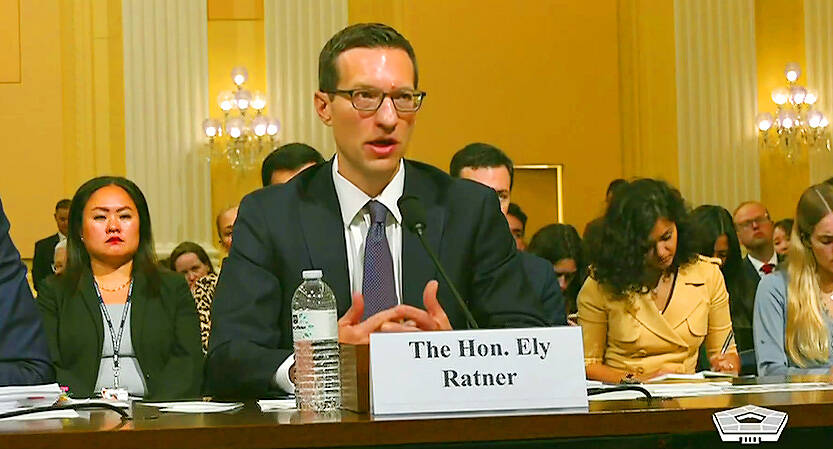Washington will expedite arms sales to Taiwan through various means including the presidential drawdown authority, US Assistant Secretary of Defense for Indo-Pacific Affairs Ely Ratner said on Thursday.
Ratner was speaking at a hearing held by the US House of Representatives’ Select Committee on the Strategic Competition between the US and the Chinese Communist Party to discuss US President Joe Biden’s China strategy.
Asked about the delay in delivering weapons to Taiwan, Ratner said: “What we are facing is not a backlog as is sometimes described, but rather concerns and slowdowns within all of our industrial base.”

Photo: Screen grab from a video on the US Department of Defense’s Web site
It is a systemic problem that is affecting not only Taiwan, but military production in the US defense industrial base, he said.
“We’re doing everything we can to fulfill our commitments under the Taiwan Relations Act [TRA] as quickly as we can” through foreign military sales, presidential drawdown authority and potentially foreign military financing, he said.
As part of the National Defense Authorization Act for Fiscal Year 2023, the US Congress authorized up to US$1 billion of weapons aid for Taiwan using the presidential drawdown authority, which authorizes the president to transfer weapons and services from US stockpiles without congressional approval during an emergency.
The US “will soon provide significant additional security assistance to Taiwan through the presidential drawdown authority that Congress authorized last year,” US Secretary of Defense Lloyd Austin told Congress in May.
“Providing these self-defense capabilities to Taiwan is one of the department’s highest priorities,” Ratner said.
“The TRA has formed the bedrock of peace, stability and deterrence in the Taiwan Strait over the last four decades,” he said.
“We’re absolutely committed to ... meeting our commitments under the Taiwan Relations Act to assist Taiwan to maintain sufficient self-defense capability. We’ll meet those obligations,” US Assistant Secretary of State for East Asian and Pacific Affairs Daniel Kritenbrink told the hearing.
On US-Taiwan economic relations, US Representative Michelle Steel said that the initial trade agreement reached under the US-Taiwan Initiative on 21st-Century Trade, which the US Senate passed on Tuesday, was welcomed, but “it’s still [a] very tiny bit, so we really have to extend that.”
Asking why Taiwan is not included in the Indo-Pacific Economic Framework (IPEF), she said: “Why leave them [Taiwan] out of the IPEF if they are a like-minded, true ally.”
Kritenbrink said that the US is focusing on the 14 partners currently in the IPEF, but reaffirmed Washington’s promise to Taiwan.
“We’re very committed to building our partnership with Taiwan, our very important, robust, but unofficial partnership,” and will continue to do so, he said.
Additional reporting by CNA

MAKING WAVES: China’s maritime militia could become a nontraditional threat in war, clogging up shipping lanes to prevent US or Japanese intervention, a report said About 1,900 Chinese ships flying flags of convenience and fishing vessels that participated in China’s military exercises around Taiwan last month and in January last year have been listed for monitoring, Coast Guard Administration (CGA) Deputy Director-General Hsieh Ching-chin (謝慶欽) said yesterday. Following amendments to the Commercial Port Act (商港法) and the Law of Ships (船舶法) last month, the CGA can designate possible berthing areas or deny ports of call for vessels suspected of loitering around areas where undersea cables can be accessed, Oceans Affairs Council Minister Kuan Bi-ling (管碧玲) said. The list of suspected ships, originally 300, had risen to about

DAREDEVIL: Honnold said it had always been a dream of his to climb Taipei 101, while a Netflix producer said the skyscraper was ‘a real icon of this country’ US climber Alex Honnold yesterday took on Taiwan’s tallest building, becoming the first person to scale Taipei 101 without a rope, harness or safety net. Hundreds of spectators gathered at the base of the 101-story skyscraper to watch Honnold, 40, embark on his daredevil feat, which was also broadcast live on Netflix. Dressed in a red T-shirt and yellow custom-made climbing shoes, Honnold swiftly moved up the southeast face of the glass and steel building. At one point, he stepped onto a platform midway up to wave down at fans and onlookers who were taking photos. People watching from inside

Japan’s strategic alliance with the US would collapse if Tokyo were to turn away from a conflict in Taiwan, Japanese Prime Minister Sanae Takaichi said yesterday, but distanced herself from previous comments that suggested a possible military response in such an event. Takaichi expressed her latest views on a nationally broadcast TV program late on Monday, where an opposition party leader criticized her for igniting tensions with China with the earlier remarks. Ties between Japan and China have sunk to the worst level in years after Takaichi said in November that a hypothetical Chinese attack on Taiwan could bring about a Japanese

A Vietnamese migrant worker yesterday won NT$12 million (US$379,627) on a Lunar New Year scratch card in Kaohsiung as part of Taiwan Lottery Co’s (台灣彩券) “NT$12 Million Grand Fortune” (1200萬大吉利) game. The man was the first top-prize winner of the new game launched on Jan. 6 to mark the Lunar New Year. Three Vietnamese migrant workers visited a Taiwan Lottery shop on Xinyue Street in Kaohsiung’s Gangshan District (崗山), a store representative said. The player bought multiple tickets and, after winning nothing, held the final lottery ticket in one hand and rubbed the store’s statue of the Maitreya Buddha’s belly with the other,